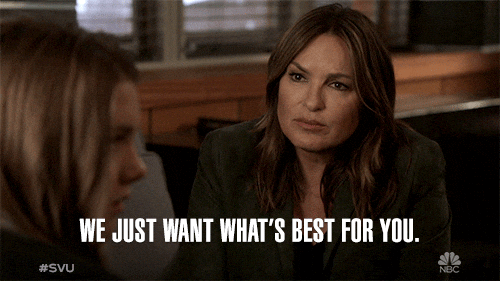Authoritarian Versus Permissive Parenting

As a child, my maternal grandmother was my favorite person. She let me do whatever I wanted. I could be the most ‘whiny’ child and she would put up with me. I had lived with her since birth as my mother was still at medical school. I had gotten the drift and gave her a really hard time while she tried hard to fulfill my every wish and fancy so I would be in good humor.
One day, we traveled to a small place of pilgrimage with her friend. I had one of my moments and sulked because I had not been granted my wish. Totally consumed and tired, my grandmother decided to discipline me. I was so shocked that she had done that. I instantly complied. But I never forgot it.
In later years, I would remind her ‘of that one time’. She, in turn, would always say, ‘You remembered that and forgot all the other times I loved you!’
I grew up to understand that violence with children did not have the desired effect. I also realized that children quickly comprehended who they could be bossy and moody with. If allowed permission, they will most definitely be walking all over us. But that is when we lose it and swing back to authority.
The model of parenting most of us grew up with was authoritarian parenting, which is based on fear. Some of us may have grown up with permissive parenting, which is also based on fear but there is a difference!
“Authoritarian parenting is based on the child's fear of losing the parent's love. Permissive parenting is based on the parent's fear of losing the child's love. Connection parenting is based on love instead of fear."
-Pam Leo (Connection Parenting)

Modern Parenting Challenges
So, the two spectrums most parents straddle are authoritarian and permissive. Fortunately, there is a significant shift today from ‘spare the rod and spoil the child’ to ‘let’s try and understand what she/he needs’. While the earlier belief was, ‘we know better, so our children must learn from us,’ we have moved to wanting to befriend the child in order to possibly be able to guide them.
With the new belief system, most parents don’t want to hurt, shame, shout, or use authority with the child to get their point across. We don’t want to maintain formality as a form of respect and choose to reach out, be kind and loving as we now know how violence may have harmed us.
Despite the support of extended families dwindling, parents want to be present for their children, protect them from failure, ‘give them the things we never had and not see them unhappy for even a moment.’ We don’t want them to go through what we went through!’ Today, parents have become the sole role models, so children depend on them for everything.
All this comes from the best of intentions but many of us have ended up at the other extreme, being permissive. We see instances of parents spending inordinate sums of money to pander to every desire, whim and fancy the child might have. ‘I want to give my child the best I can!’ This may lead children to being disrespectful to their toys, and sometimes even to Grandparents and the people who help them, especially when indulgence is not accompanied by any corrective action or conversation.

So, what leads to parents being permissive?
"Today, many parents want to be the new playmates. It’s not easy, however, with both parents working, busy and short on time. The guilt builds up because they can spend only a certain amount of time with their children and any time spent together has to be the best experience the child can have! So whether it’s toys, food, play dates, expensive trips or coaching classes, the child must have access to it all. In this regard, not knowing where to draw the boundary has given way to different challenges that more and more parents are finding difficult to navigate.
When talking about different styles of parenting, developmental psychologist Diana Baumrind says, “Permissive parents are loving, empathetic and accepting. These are good human virtues that are vital in having a good child-parent relationship.” Children of permissive parents get every need and want satisfied. They are well equipped in dialogue and have high social skills. However, they tend to become insecure, and may become impulsive and experimentative as they have no boundaries and limits set.
When we are being permissive, is it about meeting our own needs and not the child’s?
Eknath Eshwaran says setting boundaries in every relationship is healthy. Otherwise, it harms both sides and fosters selfishness and victimization, which are values of destruction.
For parents, there is research (Birgitte from PositiveParenting Ally), which talks about the reason why we become permissive. It is not the lack of control but personal fear. It could be our basic fear of not being loved, needed or wanted and that being the reason for us compromising on our own needs. When we follow our old patterns of fear, we tend to miss seeing what our child really needs. We think we’re being selfless, or harmony oriented, but these strategies are only meeting old established needs in ourselves and not necessarily helping our child.
Here’s something I’d like us all to ponder on:

Parents need to find a ‘balance’ between authoritarian and permissive parenting. The idea is not to be prescriptive in our parenting and micro-manage all that’s happening in our children’s lives. Rather, let’s give them the purpose, logic and context of our value systems. Once that is given, we as parents also need to have the restraint to step back and trust our child.
For example, it makes sense to give the child the ‘why’ (why it might be worth working hard for an exam) rather than the ‘what’ (you better sit down and study now). Once the child has ownership of the ‘why’, the ‘how’ can be offered in partnership with the child (‘let’s create a schedule together with some fun time slotted in’).
Some websites to explore:
